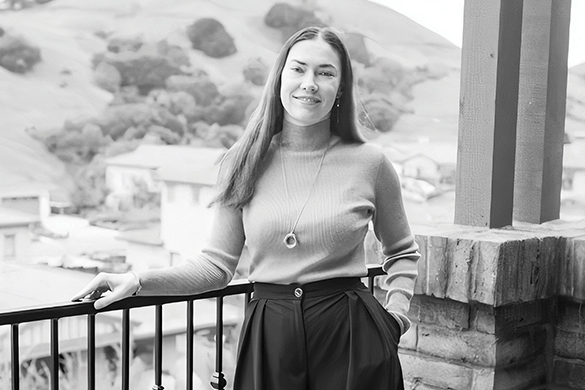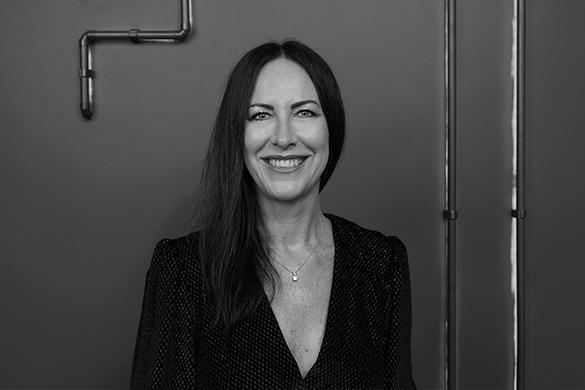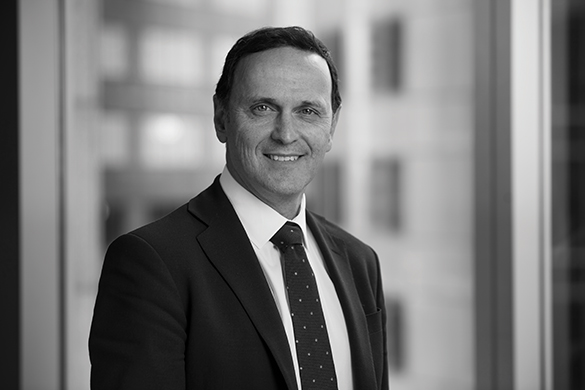- publish
A verification email has been sent.
Thank you for registering.
An email containing a verification link has been sent to .
Please check your inbox.
An account with your email already exists.
Diversity and inclusion lessons from the tech sector
Listed@ASX Winter 2021
Recent research by Chief Executive Women showed the number of female CEOs of ASX 200 companies has fallen but the number of women in CFO roles has risen, with the CFO position often a feeder into a CEO role. Drawing on the insights of a number of female CFOs in the tech sector, and a fund manager who takes notions of diversity into account when making investment decisions, this roundtable explores that dynamic and the steps that can be taken to encourage more diversity and inclusion among senior leadership teams.
Alexandra Cain, moderator, Listed@ASX: There seems to be a disproportionate amount of female CFOs in the tech sector. Why do you think that is?
Karen Hartje, CFO of buy-now-pay- later platform Sezzle: Tech is a high growth sector that represents opportunity. Women in finance are attracted to high-growth sectors for greater career development and advancement. Tech is integral to our professional and personal lives, and the pandemic has only reinforced its importance. Tech companies continue on the fast track for growth and women want to be part of the story.
Melissa Fahey, CFO, hipages: Tech is more diverse with a lot of innovation, change and growth. As a result of that, there’s opportunity and people are attracted to that environment. I know in our company we are quite diverse not just in terms of gender, but also with regard to different cultures and age ranges. We’re really focused on attracting people who will fit into our culture, no matter what their gender, culture or age. We just want a team of people who love working at our company.
Listed@ASX: Emilio, do you actively look for diversity in management and at a board level?
Emilio Gonzalez, former group chief executive officer and managing director, Pendal Group: It’s important for multiple perspectives to be brought to the table. A red flag is an executive team where individuals have similar backgrounds and think the same. We’re encouraged by management teams comprised of people from different backgrounds who are prepared to challenge the CEO. When it comes to tech, the sector is far more open minded than other industries, and welcoming of multiple views.
Listed@ASX: Is the CFO role in a tech company different to other environments?
Melissa: It’s a high-growth, fast-paced environment, generally with a high degree of change. So there is a difference in the environment compared to other industries. As a CFO, you have to be very open minded. The reporting aspect is important, but my role is also very commercial and operational and includes corporate development. You have to juggle that with your business-as-usual activities.
Ana Sirbu, CFO of productivity software firm Nitro: I have worked in software, fintech, as a growth equity investor and in private equity. Tech companies tend to have a culture of rapid growth and evolution. In tech, finance leaders tend to be very data- driven and focused on strategic insights, fast-paced collaboration and feeding insights back into the business to scale faster and more efficiently. These trends are now being adopted in other sectors as well.
Karen: The CFO role in a tech company is a marriage made in heaven because of the centrality of data. Tech companies thrive on innovation and finance teams and leaders are more focused on evolving conditions than backward-looking views. CFOs recognise and anticipate trends as they are unfolding. CFOs in high-tech companies play a bigger role setting the strategic course for the business.
Listed@ASX: Will the rise in the number of female CFOs translate to more female CEOs in the future, given many CEOs come via the CFO role?
Karen: Yes, I believe this will be the case because the CFO is the strategic partner of the CEO, particularly in tech businesses. Just as the number of female CFOs has grown in the recent past, the number of female CEOs will grow in the near future; it is natural progression within the tech industry.
Ana: The leadership funnel of women in an organisation needs to be an area of focus. There are still far more male leaders than female. This will change, but it will take time. Most people who dropped out of the workforce during the pandemic have been females, which affects the number of women in the leadership funnel. Creating flexibility at work to allow women to rise through the ranks could help change this.
Listed@ASX: Who has aspirations to be in a CEO role?
Melissa: There are now more female CFOs, which will naturally lead to more opportunities to transition to a CEO position. CFOs are also now required to be more strategic and deeply analytical; the CFO understands what drives the business from the top line and the bottom line. As a result, CFO roles are becoming more commercial and operational so that naturally leads to a potential CEO transition. I see it as an opportunity.

Ana Sirbu, CFO, Nitro
“The leadership funnel of women in an organisation needs to be an area of focus.”
COVID has helped with that as well because it has provided the flexibility to work from home, which also potentially makes the CEO and CFO role more accessible for women.
Ana: I don’t really think about that in the immediate future but later in my career, I do see it as a possibility.
Karen: One thing I have learned over the course of my career is to be flexible and open to opportunity. Never say never.
Emilio: Thinking about moving to the CEO from the CFO role, you have to consider how you engage with the board. The way you talk, present and communicate has to be CEO-like. You’re not just the numbers’ person, and need to be careful you don’t pigeonhole yourself as solely the CFO.
Listed@ASX: How has the CFO role evolved from a numbers to a leadership position?
Ana: It’s not unusual to see CFOs transition into a CEO role. Other positions, such as the chief product officer or chief operating officer, can also provide for a natural transition to the CEO role. The transition into the CEO role can happen through any of the other C-level positions as well. But the path to the CEO position is often through a CFO, COO or CPO role because these functions are inextricably linked to defining and executing on the strategy of the company. The CFO role is really a partnership role to the CEO, so in some ways it’s a training ground.
Listed@ASX: How important is having women on the board in encouraging other women through senior executive ranks?
Melissa: Having women on the board serves as inspiration for women in the leadership teams and throughout the company to pursue career opportunities. Having a diverse group of directors brings a richer and fuller conversation to the board that adds value to a company.
Listed@ASX: How important is the representation of women in line management roles in tech?
Ana: Having female leaders normalises women in leadership roles across all levels in an organisation, so it’s very powerful. It also helps attract more women into an organisation and helps populate the funnel of future female leaders.
Whenever there’s an interview process for a candidate, it’s important to make sure the funnel contains diversity in the pool of candidates. As leaders, we need to hire the best person for the job. Making sure there is representation in the candidate pool is something we can all be focused on and that can be very powerful. At Nitro, we announced our ‘flexible forever’ approach to work, including remote hiring and flexibility to work from home. Hopefully, we’ll see increasing flexibility at work globally, which will also help achieve more diverse teams, including at the management level.

Melissa Fahey, CFO and COO, hipages
“Having a real understanding of the operations of the business helps me to be a better CFO because it puts the numbers in context.”
Listed@ASX: Melissa, your role combines the CFO and COO functions. How do you manage such a diverse group of responsibilities?
Melissa: To me, the COO role is a natural extension of the CFO role. Today the CFO role is also strategic and commercially- focused. Having a real understanding of the operations of the business helps me to be a better CFO because it puts the numbers in context. I managed a large transformation change project when I first joined hipages. That involved looking at our business in terms of the commercials of our product, looking at our operations and implementing efficiencies. That gave me a deep understanding of the business to deliver the financial outcomes. To me the combined role is a real positive. True, it is a large role and it’s not for all organisations because it really depends on their operations. For us, it works really well and like anything, you need to get the balance right as sometimes the CFO role can be demanding and other times the COO role can be demanding.
In terms of managing a large role and responsibilities. I think that takes ongoing management throughout your career and life. As a female, we often have to make choices. I know I have. At times I have chosen family over career for a period and then when the time was right I refocused back to my career. Sometimes I don’t get the balance right however you can have a family and a really great career. Having female role models creates a mindset that there is no glass ceiling – you can be a female CFO or CEO.
Listed@ASX: Do you think females approach leadership in a different way to their male peers?
Karen: We have a set of core values in our organisation and as leaders, we strive to model those values. That being said, everyone leads in their own authentic voice. Leaders that are least effective are those that lead in a style that does not ring true. I believe in common sense and the golden rule – treat others as you wish to be treated.
Ana: While I think women tend to be great listeners, I haven’t really focused on female versus male leadership styles. I just think about being true to my own leadership style. I’m very collaborative and data-driven, and I like to set ambitious targets and then, collectively with my team, hit them. I have a coaching style and I like to foster debate and invite different perspectives.
Emilio: Leadership starts from a very young age and builds over a lifetime, influenced by the people around you and bosses to whom you have reported. Along the way as your career develops you work out what works for you, blended with your beliefs and experiences. If male and female leadership styles are different, it’s partly because society interacts differently with men and women.
Melissa: I don’t focus on whether females or males are better leaders. I appreciate you can make generalisations that are related to social influences. For me, I believe it’s the individual and their skills that make a great leader. I believe in leading by example. My style is also collaborative and grounded in effective listening and seeking to understand. That’s really important as a leader.
Listed@ASX: Anecdotally, there’s a view women are more internally focused than men. What importance do you put on the external facing aspects of your role and how do you raise your public profile?
Melissa: People say male executives are more vocal and females are more internally focused. I also think it comes down to the individual. I know in the past I have not been externally focused enough as I have been so busy getting the job done.
Over the past year I’ve really enjoyed the investor relations side of the role and have emphasised the external-facing aspect, presenting at conferences, participating in panels and putting more work into my LinkedIn profile and connections. It’s all really important in terms of your personal brand, connections and opportunities for you and also for your company.
Karen: I could be better at drumming up opportunities. That being said, I never say no to a great networking event. Since becoming a public company, we are continually meeting with current and prospective investors. Building my network has become a priority.
Ana: Having an external presence is an inherent part of the role and something I really enjoy. Investor relations is a big one. I’m also part of several CFO networks that allow me to share my insights and ask for insights from others. I also mentor women within the business and outside the company as well.

Karen Hartje, CFO, Sezzle
“We are continually meeting with current and prospective investors. Building my network has become a priority.”
My advice to other women or anybody who’s interested in creating a personal brand is to be deliberate about it. I advise younger leaders to think about their external network or their professional brand. I encourage them to set some specific goals like participating in five conferences per year or making 10 new connections they would meet with on a quarterly basis to form an ongoing, symbiotic dialogue with a network outside the business.
Melissa: Mentoring has been really important throughout my career. I’ve had a couple of mentors who have previously been CFOs or investment executives, which has been crucially important.
I always asked their advice at critical times in my career. I’ve also mentored other people over my career, including male CFOs.
Karen: Early in my career I had a mentor who was a CFO and a trailblazer. I was inspired by her brilliance, her kindness and her wonderful sense of humour. Mentoring young women, in both formal and informal capacities is rewarding and fun.
Listed@ASX: Do women have as much confidence as men to apply for senior roles?
Karen: Knowledge builds confidence. I’m not speaking of only subject matter knowledge but also its leadership nuances. Having mentors and allies can help women better understand all aspects of the roles to which they aspire.
Ana: Women like to be a lot better prepared before putting themselves forward versus men. I like to encourage women on my team to take on new projects or opportunities.
Listed@ASX: Emilio, how important is the ‘S’ in ESG when you assess an investment, especially around diversity? How do you try to influence companies around this?
Emilio: We engage with companies to understand their strategic direction and actions to improve their performance and then measure their progress along the way. We do engage directly with companies on particular issues behind the scenes, either at the request of the company or at our instigation. This direct form of engagement with boards is a much more friendly way to be heard, exchange views and achieve an outcome than in the public arena where it is seen as adversarial. It doesn’t mean you have to agree but at least there has been a dialogue where views have been shared and considered. As the largest active investor in Australia we regularly have open discussions with chairs and CEOs on a variety of issues, with most conducted in a positive and open manner.
Listed@ASX: As CFOs, how important is ESG in your work?
Melissa: We’re very focused on it, not just in my role, but at board level. We’re constantly monitoring our position.
Karen: This is top of mind for me as we just became a Certified B Corporation. Short term profits don’t necessarily trump long term gain and what’s best for our customers, merchants, employees, communities and shareholders. We believe doing good is good for business.
Ana: From a social perspective, it’s hugely important. We ensure our employees know Nitro supports them.
Listed@ASX: Is there a cultural difference between the US and Australia, in terms of women’s leadership aspirations?
Karen: I’m based in the US and have spent time in Australia. Based on my observations, people are people, and I think women in the US and Australia face similar challenges and opportunities.
Melissa: I’m based in Australia and I haven’t worked in the US so can’t really comment on differences in women’s leadership aspirations. I have dealt with management teams, investors, brokers and analysts around the world and I haven’t noticed any material differences apart from obvious cultural differences.
Emilio: I was on a call this morning with 20 people from around the globe. There are cultural differences in how people engage, how they come into a conversation and the length of their response – how they speak to the question or deviate. All these things are different because of the different cultures in which individuals have grown up. There are diverse norms, habits and understandings of what is acceptable and what is not. Hence the way I approach people is differs. The US is far more inquisitive, prepared to engage, often at length, and open to challenge. The UK is more circumspect and respectful of seniority whereas Australians are more reserved but up front.

Emilio Gonzalez, former group CEO and MD, Pendal Group
“Have a mentor or someone you can go to outside the organisation.”
Listed@ASX: What are your words of advice to women aspiring to be in a senior leadership role?
Karen: Set and communicate your goals. Volunteer for extra projects or work that closely aligns with the roles that interest you. Be persistent. I am enjoying the best role of my life. It took my entire career to get here and it is worth every hour of blood, sweat and tears. Don’t give up.
Ana: Bring your authentic self to work, focus on learning and impact in your organisation. Be very deliberate in pursuing the projects you want to work on, in networking and in charting the course toward the next step in your career.
Emilio: Have a mentor or someone you can go to outside the organisation; someone you can trust as a sounding board, especially when it comes to seeking advice about your career and that next senior leadership position.
Melissa: Plan for where you want to get to, think ahead and be really focused and vocal. Show your skill set and don’t be shy about that. Have the mindset nothing is holding you back. Believe you’re great at what you do, have goals and plans and the path to get to there.
Related links
Subscribe to Listed@ASX
Download the “Listed@ASX” app - available from the Apple App Store and Google Play - or email listed@asx.com.au to request a hard copy of the magazine.
About the author

Alexandra Cain, Freelance finance writer
Alexandra Cain is a freelance finance journalist who writes for The Australian Financial Review, the Sydney Morning Herald, In the Black and Forge magazine. Some of her corporate clients include BT, the Commonwealth Bank, Deloitte and Macquarie Bank. She lives, works and surfs in sunny Dee Why.
About Listed@ASX magazine
ASX’s bi-annual Listed@ASX magazine covers listed company best practice and issues of interest. With professional journalism and a subscription list covering directors, CEOs, senior executives, company secretaries and advisers of listed companies it is a must-read for members of the ASX listed community.